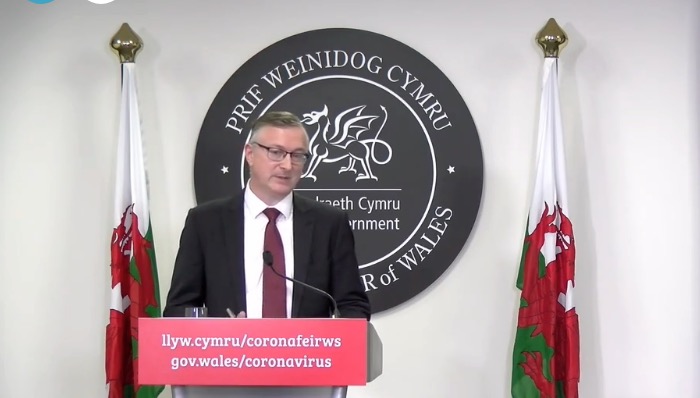NHS Wales Chief Exec: ‘Equivalent to more than 50 hospital wards across Wales full of coronavirus patients’

The equivalent of over 50 hospital wards across Wales are currently full of patients with coronavirus.
Dr Andrew Goodall, chief executive of NHS Wales, yesterday spoke of his concern about the the strain coronavirus continues to put on the health service.
There are 18 hospitals in the country reporting the highest levels of pressure as staff continue to deal with Covid-19 patients and routine services.
The total number patients receiving treatment relating to the virus in hospitals stands at 1,654 – an eight per cent increase on the previous week – with 400 of them said to be in recovery.
Meanwhile, more than a third of critical care provision in Wales is being occupied by coronavirus patients, with 62 being treated.
Speaking at yesterday afternoon’s Welsh Government media briefing, Dr Goodall said that whilst there are some signs that hospital admissions are stabilising, it is “not sufficient” to overcome the current pressures.
He added that although there has been a fall in the number of confirmed cases following the recent firebreak measures, the number of coronavirus related deaths being reported by Public Health Wales remains high.
In the last month alone, there have been 532 deaths, which Dr Goodall stressed were people and “not just numbers”.
He said: “Nearly half of people admitted to hospital with Covid-19 will be there more than a week.
“A quarter will be in hospital for at least 21 days or more. Some will need even more time and expert care to recover properly.
“As you would expect this has a knock on effect on available bed capacity.
“This is why I’m concerned about the impact of the demands and pressures on the NHS.
“The NHS remains open for essential and emergency services and also for routine care.
“But with high levels of coronavirus infection in our communities and high levels of people with coronavirus in hospitals, services will find it increasingly difficult to operate normally.”
During the briefing, Dr Goodall also spoke of the impact treating coronavirus is having on staff, with those dealing with patients having to wear full personal protective equipment throughout the day.
The virus has also had an impact on the number of outpatients, with clinics witnessing around two thirds fewer people in order to ensure they comply with social distancing requirements and to complete the cleaning regimes needed between each appointment.
As a result, there has been an increase in the number of patients seen virtually for appointments.
There is also a growing waiting list after non-emergency services were cancelled at the start of the pandemic and due to the additional protective measures that need to be put in place between patients.
Dr Goodall said: “Coronavirus has affected almost every aspect of health care from learning how to treat and care for people who are seriously ill with Covid-19 – to making physical changes to clinics, surgeries and operating theatres, to protect staff and patients from the risk of contracting this highly infectious virus.
“I want to say something about the immense pressures some of our critical care units are facing and give you a snapshot of what staff working in this highly specialised service are experiencing every day.
“Working in full PPE for a whole shift is hot and difficult, I don’t think many of us can imagine what this must be like. There’s an increased need for breaks so staff can take off the equipment.
“Covid and non-covid patients need to be kept separate in what are often small departments, increasing the workload and complexity for our staff in their care for patients.
“There’s a higher level of staff sickness as critical care staff are affected by the pandemic and may have to self isolate.
“Patients being cared for in critical care are the sickest in the hospital, this inevitably has a personal impact on staff.
“Staff are often redeployed to critical care from other parts of the hospital, such as theatres. This shows just how flexible the NHS can be when under pressure.”
He added: “I want to emphasise that while we are doing everything we can to increase routine activity in the NHS, it is not possible to return all services to normal, particularly with high numbers of positive coronavirus cases in our communities.
“The NHS remains under significant pressure from pandemic and winter demands.
“I want to acknowledge and thank all our health and care staff for their commitment and for everything they are doing to respond to people’s needs in these most challenging of circumstances.
“They’re working in a very stressful environment and have been year round.
“They remain focused on supporting care and treatment for the people of Wales.
“We want to ensure, with your support that the NHS can continue to deliver it services in a safe and accessible manner.
“You can help us to help you by following the rules – keeping your distance from each other, practicing good hand hygiene, working from home wherever you can and wearing a face mask in indoor public places.
“Together, we will keep Wales safe.”
Spotted something? Got a story? Send a Facebook Message | A direct message on Twitter | Email news@north.wales






